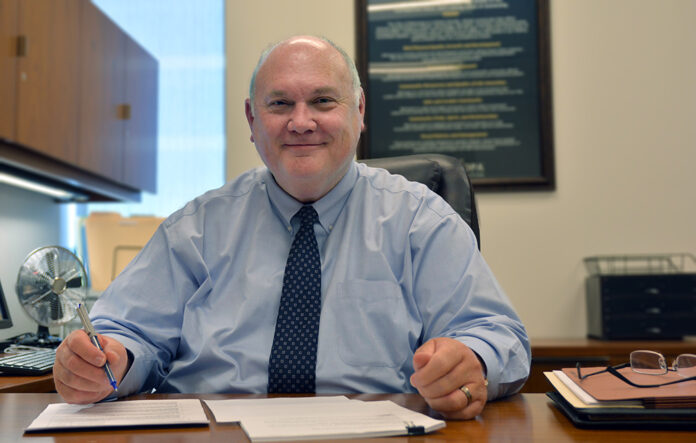During his first 100 days as Maricopa’s city manager, Rick Horst has worked to make City Hall more results-oriented and streamlined. There have already been changes, including a new department. Horst sat down with InMaricopa to talk about the first three months of his three-year contract.
InMaricopa: So, you’re still in the honeymoon phase.
Horst: I tell people it’s three months going on three years. As the old saying goes, drinking out of a firehose. But that’s what I enjoy. It’s been fun. It’s been educational. We’ve been able to set some things in motion. We have a lot of things on our list yet to set into motion. It’s why I’m here; it’s why I wanted to be here.
InMaricopa: As a leader, what kind of imprinting did you want to have on your employees?
Horst: I’ve never been one for silos. I think we’re all one team. I kind of use the football analogy that, yes, a football team has offense and defense and special teams, but they all wear the same uniform, and at the end of the day they have the same goal. That’s to win. I find sometimes that we need to make sure that our main objective is to meet the goals that we’ve made. I’ve always felt that government is really good at process, but we should be good at results. I really want our employees to feel empowered to make decisions at the lowest level possible. I want us to streamline. I want us to make things more simple. I want us to spend time in achieving goals, not figuring out the process of how to get there.
InMaricopa: How did you go about learning the institutional culture?
Horst: Well, you learn pretty quickly, right? I’ve invested myself in a lot of the meetings. I don’t believe in micromanaging, but at the same time, what I knew I had to invest myself in the system to learn what is going on and what they’re trying to do, what processes they have. I think sometimes we work so hard to create the momentum, the process, the program, and we work so hard we don’t want to let it go. We do things right, but we don’t always do the right thing.
InMaricopa: What are some key areas you’re focusing on?
Horst: We’re hoping to deregulate, not only internally but externally, to make it easier for those whom we’re here to serve. We’re hoping to streamline our processes. I use the term, sometimes we spend a dollar to save a nickel, and I want to be careful that we don’t do that. There’s two structures within government – there’s the structure that supports the services we provide, IT, Finance, HR. The other is there to serve the customer, which is the people who provide the operations and services of the City, which is Public Safety, Parks and Recreation, Streets, etc. Our job is to make sure we can internally support those purposes by streamlining how quick they can get personnel hired, how quick they can get resources, materials, the things they need to do their job, and to make sure we don’t get bogged down in process so we can kick out the product at the end of the day.
InMaricopa: So, the process is something governments get bogged down in?
Horst: I think we do… The real mission, from my perspective, of the city besides public safety, which is foremost, is to create an environment where the community can be successful. Whether that is a single parent raising their children, whether that’s a nonprofit, or whether that’s a small business or a big business or a school, or whatever those things are, to allow them to be successful. We don’t have to control everything. We just have to control those things that are the core mission of the City. A lot of cities like to get into ventures that the private sector can supply. We want the community to not be without, so we want to create the opportunity to get the private sector to fill in some of those gaps rather than try to fill them ourselves.
InMaricopa: What are some of the clear-cut strategies you’ve given your team?
Horst: Well, I’m trying to empower them. For instance, we’ve merged all our support services together to a new department called Administrative Services. So, our IT, Finance, HR and those type of things are now under one leader, which is Jennifer Brown as our department head. Therefore, she can cross-utilize those resources. As an example, HR today has to know it’s very involved with financial numbers, and vice versa. Current costs, future costs, benefit costs, all those type of things, so everything can’t be done in a vacuum. It has to be done more holistically as we approach these issues. I sometimes find a department can create a great idea and implement it but didn’t realize it created some unforeseen consequences for another department or action. So, we want to come together and resolve those issues and be collective in our focus. We really have a great team, and they’re accepting these changes and welcoming these changes. To some degree, they’ve taken the handcuffs off so they can be more effective in what they’re doing. Every one of our employees has something significant to offer. We just need to be patient enough to hear them out… So, I’m encouraging people to talk back to the boss, so to speak. Just be polite about it. (Laughs)
InMaricopa: What did you consider City Hall’s strengths when you took the job?
Horst: We have great people. We have talented people. Most of them are not here for a paycheck; they really want to make a difference. And they really work hard to make a difference. They go the extra mile. And I consider them public servants, not employees. Most people won’t ever understand all the things they do to benefit the community. A lot of them do things in their spare time after hours. They participate in other community events, charities, programs, all because they care about this community. They are well invested both personally and professionally.
InMaricopa: Where did you find City Hall lacking?
Horst: If we do something in 15 steps, we could probably do it in 10. Or if it’s in 10, we can do it in five. We’re looking at our processes and we’re saying, “Did it outlive its usefulness? Is there a way to do it better? Are we still doing it because we worked so hard to put it in place?” Sometimes you’ve got to give it up and move onto something new. The city’s changing every day.
InMaricopa: In your short time here, are there areas you’ve already shifted the City?
Horst: We had a centralized purchasing program, and we’re going to decentralize that, and we’re going to be presenting that to the City Council. What that will do is eliminate the bureaucratic process. As an example, if the Street Department needs to order a particular asphalt material to pave roads, that goes up to a Purchasing Department that then prepares the specs and bids. They’re not the experts on that, and it adds another layer. So, if we could have the ability to have these department reach out and do this on their own because it’s their area of expertise – and by the way, department heads are charged with the protection of their budgets – it’s putting the authority and ability to do it back into the departments rather than at centralized purchasing. That will save both time and money. That’s not to say it was broken; it’s a good, better, best thing. We can do better.
This story appears in the October issue of InMaricopa.




![Shred-A-Thon to take place tomorrow An image of shredded paper. [Pixabay]](https://www.inmaricopa.com/wp-content/uploads/2024/03/shredded-paper-168650_1280-218x150.jpg)












![Shred-A-Thon to take place tomorrow An image of shredded paper. [Pixabay]](https://www.inmaricopa.com/wp-content/uploads/2024/03/shredded-paper-168650_1280-100x70.jpg)
